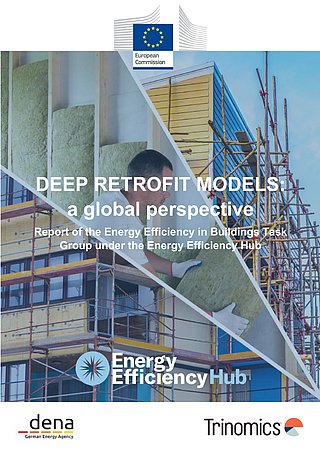On track to global building decarbonisation
Ludwig Labuzinski, Senior Expert for International Building and Construction at dena, on deep retrofitting as an approach to energy-efficient renovation and why an integrative approach is particularly important internationally.

The global building stock continues to be responsible for 26% of global greenhouse gas emissions due to inadequate energy efficiency and continued dependence on fossil fuels. Effective solutions to reduce emissions are therefore needed urgently. Deep retrofitting - recently discussed at COP29 in Azerbaijan - is one such solution. As the operating agent of the international Energy Efficiency in Buildings (EEB) Task Group, dena produced the ‘Deep Retrofit Models’ report to demonstrate the potential of an integrative approach.
Deep retrofitting
Deep retrofitting is an approach to energy-efficient renovation with the aim of significantly reducing energy consumption and emissions whilst at the same time improving building efficiency. What does this mean in practice? There have been very different definitions and political approaches internationally to date. The reason for this are the very different effects of factors such as climate, building age and type, building history, cultural and economic context as well as the respective legal and political framework depending on the region of the world.

Country-specific recommendations to facilitate the use of deep retrofitting
In order to make deep retrofitting more applicable internationally, the report initially clustered recommendations into four categories and explained them on a country-specific basis:
- Regulatory law/regulations: Development of a comprehensive political and legal framework and clear definitions for ‘deep retrofit’
- Financing/funding: Financing schemes that take the attractiveness and affordability of basic renovations and innovative de-risking systems into account
- Technical aspects: Platforms for knowledge exchange and investment programmes for education and training
- Social aspects: Technical assistance and awareness-raising programmes
The comprehensive collection of promising international policy approaches is a particular added value of the EEB report:
In Argentina, the ‘Weatherization Without Borders’ programme supports low-income households in improving their energy efficiency. The ‘Deep Retrofit Accelerator Initiative’ from Canada finances organisations for the comprehensive retrofitting of apartment buildings and commercial buildings. France's ‘MaPrimeRénov’ is a subsidy programme that bases financial support on income and energy savings. In Germany, the ‘individual retrofit roadmap’, among other things, was presented as an important tool en route to comprehensive retrofits. South Korea supports the framework conditions for deep retrofitting through a ‘Green Remodelling Support Project’, and in Saudi Arabia, a government campaign aims to encourage people to replace inefficient air conditioning units. Building on previous activities, the group will continue its work on deep retrofitting and make it a focus of international discussions.
The Energy Efficiency in Buildings (EEB) Task Group
The Energy Efficiency in Buildings (EEB) Task Group has the task of putting the issue of increasing energy efficiency in existing buildings on the global agenda and, in particular, exchanging information on political practices. Current members of the platform are Argentina, Brazil, China, Germany, the European Commission, Saudi Arabia and South Korea. Other countries, such as Canada, France and the USA, have actively contributed to the group's current work.
You can find the latest report on deep retrofitting and more information on the Energy Efficiency in Buildings (EEB) Task Group here: https://energyefficiencyhub.org/resources/deep-retrofit-models-a-global-perspective/
You can find the deep retrofit panel from COP29 here: https://energyefficiencyhub.org/resources/deep-retrofit-models-a-global-perspective-2/